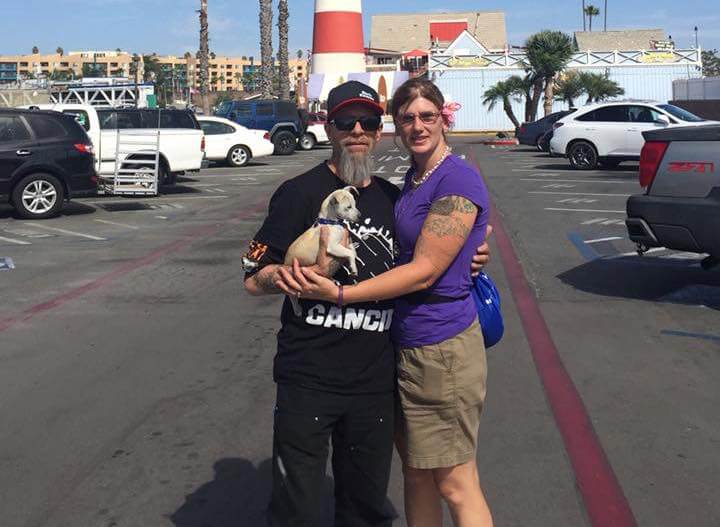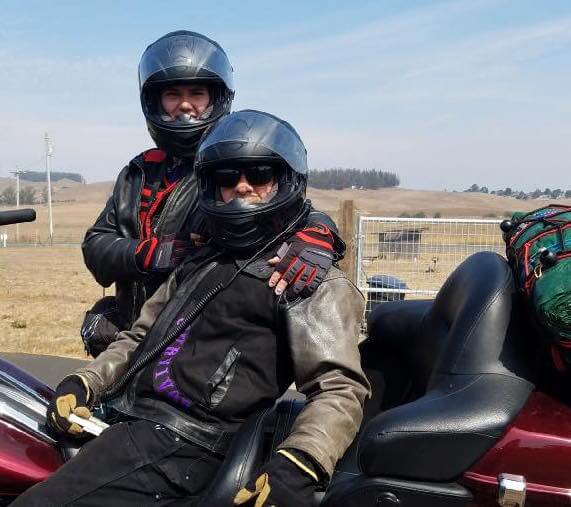Anthony Guido sums up his life largely in numbers. He worked construction for more than 30 years, has ridden 500,000-plus miles by motorcycle since turning 18, and shares a combined four children and 16 grandchildren with his wife, Shelly. Guido is proud of it all, but what has him most excited these days is marking the 35 months since December 23, 2016 — the date of his 12th and final chemotherapy infusion for stage III pancreatic cancer.
“I’m not cured, but I’ve had no evidence of disease for nearly three years,” says Guido, a 62-year-old retiree and Army veteran who lives in New Hampshire. “I feel great and am enjoying myself, and it’s all thanks to my angels.”
That’s a reference to his primary oncologist Kimmie Ng, MD, MPH, and the other caregivers and support staff at Dana-Farber/Brigham and Women’s Cancer Center (DF/BWCC). Guido had his radiation and chemotherapy at DF/BWCC, where he received combination chemotherapy with Folfirinox for treatment of unresectable pancreatic cancer. Sequencing of his germline and tumor DNA, also conducted at DF/BWCC, identified a BRCA2 mutation that enabled his team to provide him with more targeted treatment with a PARP inhibitor, olaparib. This personalized approach, Ng says, is likely the key to his long disease-free period.
“Pancreatic cancer is notorious for being really difficult to detect early, and very difficult to treat, but we’ve made huge advances here in terms of being able to understand the genetic code underlying pancreatic cancers,” says Ng, director of clinical research in the Gastrointestinal Cancer Center at Dana-Farber. “Having that knowledge has allowed us to deliver personalized care and individualized treatment to patients like Anthony, which produces much better results than could be achieved by standard chemotherapy alone.”

From chemo to California
Guido, a New York City native, was working as a mechanical superintendent on a job in Baltimore when he began having abdominal discomfort in 2015. He ignored it for several months, since he was used to working through pain. Only when his back also started acting up, and he became constipated, did he finally consent to a doctor’s visit.
One CT scan later, he was told he had a mass on his pancreas and needed to be seen by a cancer specialist immediately.
“My maternal grandmother and mother both died young from cancer, but I really didn’t know anything about it,” says Guido. “As soon as we got to Dana-Farber, everybody was awesome — from the lady stamping my ticket to the infusion nurses all the way to Dr. Ng. Traveling down from New Hampshire every few weeks was tough, and expensive, but the VA covered our medical expenses and the Elks Riders organization gifted us travel money. Friends and family helped, and Dana-Farber connected us to programs offering low-cost hotel rooms.”
Guido had some side effects from his chemo, but never missed one infusion. He also started feeling better, enough so that when he finished treatment he and Shelly celebrated with a cross-country motorcycle trip that coincided with his 60th birthday and their fifth wedding anniversary. The 8,000-mile “Team Guido Victory Tour” brought them to Southern California and a visit with their two oldest sons and their families.

Ng says that Guido’s excellent attitude, despite the challenges of his treatment, played a big role in his positive response.
“He’s a great patient, and having patients like him — and seeing them do as well as he’s doing — are the reason why we go to work every day and do the research that we do,” says Ng.
Raising hope
His days of cross-country rides are not over, Guido says. He still gets out on the blacktop often, and to the sand to indulge his other hobby of beachcombing. And while he no longer sports the long beard he used to dye purple — the official color for pancreatic cancer awareness — he still wears purple every day and keeps a stash of wristbands inscribed with the credo “Wage Hope” to hand out.
He’s hoping to do advocacy work at Dana-Farber, too, as a way of passing on some of his optimism to other patients.
“I want to speak to people and let them know that if you listen to your doctors, and do what they tell you, you can fight this,” says Guido. “You know, encourage them. Give them hope.”
In the meantime, as another holiday season nears, Guido keeps busy fixing things at the family’s home in the woods and visiting with his and Shelly’s children and grandchildren. This leads to an inevitable question: How does he keep track of 20 birthdays, not to mention all those Christmas cards and gifts?
“My wife does a great job with that,” he says, laughing. “I stay out of it.”
